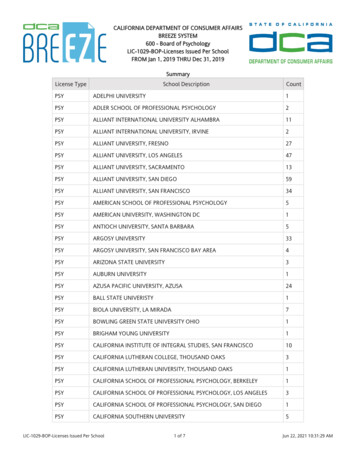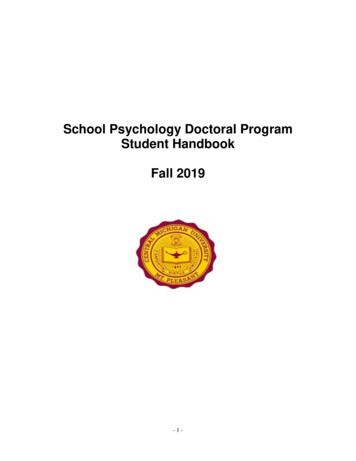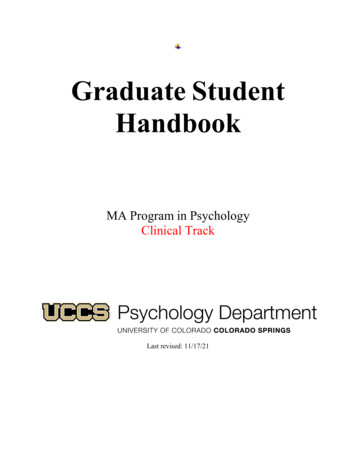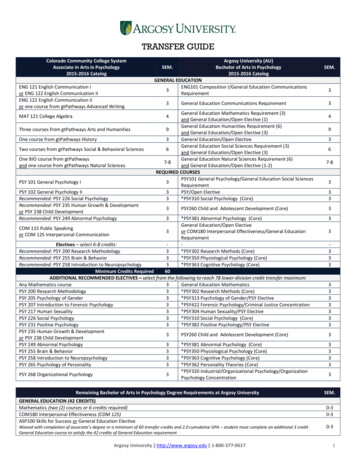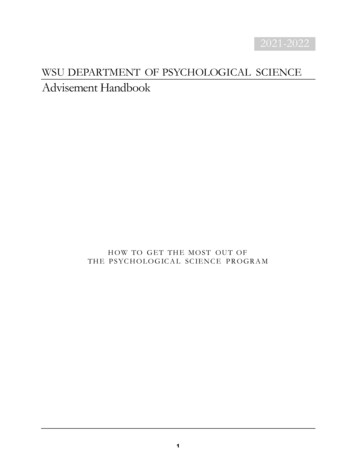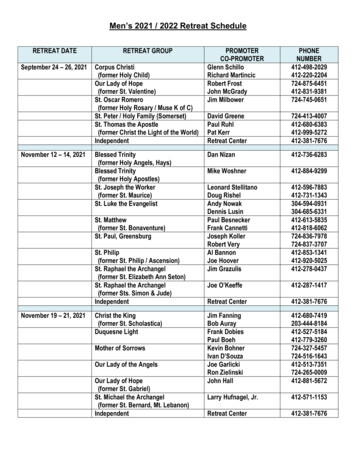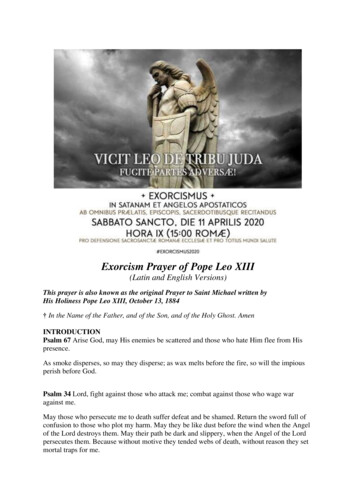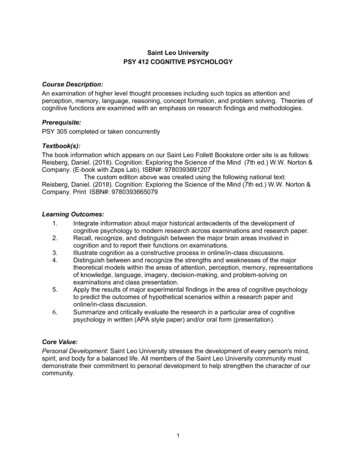
Transcription
Saint Leo UniversityPSY 412 COGNITIVE PSYCHOLOGYCourse Description:An examination of higher level thought processes including such topics as attention andperception, memory, language, reasoning, concept formation, and problem solving. Theories ofcognitive functions are examined with an emphasis on research findings and methodologies.Prerequisite:PSY 305 completed or taken concurrentlyTextbook(s):The book information which appears on our Saint Leo Follett Bookstore order site is as follows:Reisberg, Daniel. (2018). Cognition: Exploring the Science of the Mind (7th ed.) W.W. Norton &Company. (E-book with Zaps Lab). ISBN#: 9780393691207The custom edition above was created using the following national text:Reisberg, Daniel. (2018). Cognition: Exploring the Science of the Mind (7th ed.) W.W. Norton &Company. Print ISBN#: 9780393665079Learning Outcomes:1.Integrate information about major historical antecedents of the development ofcognitive psychology to modern research across examinations and research paper.2.Recall, recognize, and distinguish between the major brain areas involved incognition and to report their functions on examinations.3.Illustrate cognition as a constructive process in online/in-class discussions.4.Distinguish between and recognize the strengths and weaknesses of the majortheoretical models within the areas of attention, perception, memory, representationsof knowledge, language, imagery, decision-making, and problem-solving onexaminations and class presentation.5.Apply the results of major experimental findings in the area of cognitive psychologyto predict the outcomes of hypothetical scenarios within a research paper andonline/in-class discussion.6.Summarize and critically evaluate the research in a particular area of cognitivepsychology in written (APA style paper) and/or oral form (presentation).Core Value:Personal Development: Saint Leo University stresses the development of every person's mind,spirit, and body for a balanced life. All members of the Saint Leo University community mustdemonstrate their commitment to personal development to help strengthen the character of ourcommunity.1
Evaluation:AssessmentDiscussion/Participation (8)Labs (10)Term Paper (1)Presentation (1)Quizzes (8)Total Percentage10%15%30%15%30%In the on-ground program on the main campus we use four examinations, a term paper with inclass presentation, and class participation in determining a student' s grade.The following distribution will be used in assigning grades (decimal points will be rounded to thenearest whole number at semester’s end) (IOR may not alter):GradeAAB BBC CCD DFPercentageExceptionalSuperiorExcellentVery GoodGoodAbove AverageAverageBelow AverageMarginalPoorFailure94% to 100%90% to 93%87% to 89%84% to 86%80% to 83%77% to 79%74% to 76%70% to 73%67% to 69%60% to 66%Below 60%QuizzesTests can be a combination of multiple-choice, true-false, matching, short answer and essay.Students should be asked to provide descriptions of phenomena, theories attempting to explainthese phenomena, and research evidence supporting and/or refuting these theories. In additionsome objective questions or identifications might be included as well. Tests should representapproximately 40-50 % of the final grade.Term PaperBecause this is 400 level course, a term paper (following a literature review) should be included.The term paper should be aimed at a critical evaluation of research supporting and/or refutingone of the theoretical positions currently under investigation in the areas of cognitivepsychology. Alternatively, this paper may take the form of a research proposal including a morespecific literature review leading to a detailed description of a proposed experiment designed totest that theoretical position. (Note - this would be only a proposal for a research project, whichwould not actually be carried out, due to time constraints and the requirement that all researchbe pre-approved by the Saint Leo Institutional Review Board.) An in-class presentation of thepaper is an option that should considered. The paper should represent approximately 15-35% ofthe final grade.)2
PresentationIllustrate through demonstration, video project, or presentation the practical applications ofcognitive theory in everyday life (e.g., memory/formgetting, decision-making, problem solving,etc.). Presentations should include an annotated bibliography of all sources and be constructedthrough Powerpoint or other presentation multimedia software. Students may also choose tocreate a video or, for on ground class, a demonstration. The presentation should representapproximately 10-15% of the final grade.Discussion/ParticipationDiscussion/Class participation may also be considered as a part of the evaluation criteria,counting for between 15-25% of the student's final grade.Assessment of the Learning Outcomes:Course Learning Outcome123456Assessment MethodQuizzes and Research Paper, DiscussionExams, DiscussionResearch Paper and Presentation, DiscussionQuizzes, Research Paper, and Presentation, DiscussionResearch Paper and Presentation, DiscussionResearch Paper and Presentation, DiscussionCourse Schedule:Module 1 Cognitive Psychology – History and TodayObjectives When you complete this module, you should be able to: Integrate information about major historical antecedents of the development of cognitivepsychology to modern research across examinations and research paper. Recall, recognize, and distinguish between the major brain areas involved in cognitionand to report their functions on examinationsReadings Chapters 1 & 2AssignmentsItems to be Completed:Post an introduction to the classPost an initial response to the discussionquestionPost responses to at least two classmatesPaper Writing: Overview & TopicZAPS Lab 1Complete Quiz 1Due No Later Than:Thursday 11:59 PM EST/EDTThursday 11:59 PM EST/EDTSunday 11:59 PM EST/EDTSunday 11:59 PM EST/EDTSunday 11:59 PM EST/EDTSunday 11:59 PM EST/EDT3
Module 2 Visual Perception and Object RecognitionObjectives When you complete this module, you should be able to: Distinguish between and recognize the strengths and weaknesses of the majortheoretical models within the areas of visual processing Compare and Contrast processing theories for word, object, and facial recognition Explore the sensation process for vision and its relationship to perceptionReadings Chapters 3 & 4AssignmentsItems to be Completed:Post an initial response to the discussionquestionPost responses to at least two classmatesZAPS Lab 2Complete Quiz 2Due No Later Than:Thursday 11:59 PM EST/EDTSunday 11:59 PM EST/EDTSunday 11:59 PM EST/EDTSunday 11:59 PM EST/EDTModule 3 Attention and Working MemoryObjectives When you complete this module, you should be able to: Distinguish between and recognize multiple theories of attention, its neural connections,and ways in which attention manipulates our experience of the world Distinguish between and recognize the strengths and weaknesses of the majortheoretical models for the manipulation of information across theories of workingmemoryReadings Chapters 5 & Chapter 6 (pages 213 & 214)AssignmentsItems to be Completed:Post an initial response to the discussionquestionPost responses to at least two classmatesZAPS Lab 3Complete Quiz 3Due No Later Than:Thursday 11:59 PM EST/EDTSunday 11:59 PM EST/EDTSunday 11:59 PM EST/EDTSunday 11:59 PM EST/EDT4
Module 4 Long-Term MemoriesObjectives When you complete this module, you should be able to: Explore the process and systems used to create long-term memories through the rolesof elaboration, connecting to meaning, and organizationDistinguish between theories of acquisition and retention, factors that influence thisconnection, and the influence of stored information on the process of perceptionReadings Chapters 6 & Chapter 7 (first half of page 254)AssignmentsItems to be Completed:Post an initial response to the discussionquestionPost responses to at least two classmatesZAPS Lab 4aZAPS Lab 4bComplete Quiz 4Due No Later Than:Thursday 11:59 PM EST/EDTSunday 11:59 PM EST/EDTSunday 11:59 PM EST/EDTSunday 11:59 PM EST/EDTSunday 11:59 PM EST/EDTModule 5 Recall, Remembering, and ForgettingObjectives When you complete this module, you should be able to: Differentiate Explicit and Implicit memory systems and their impact on the creation,instantiation, and preservation of memory.Differentiate between forms of memory impairment and deficitDistinguish between types and processes for memory errors.Differentiate and explain theories for the process of forgetting material.Explore concepts within autobiographical memory.Readings Chapter 7 (second half of page 255)AssignmentsItems to be Completed:Post an initial response to the discussionquestionPost responses to at least two classmatesZAPS Lab 5Complete Quiz 5Due No Later Than:Thursday 11:59 PM EST/EDTSunday 11:59 PM EST/EDTSunday 11:59 PM EST/EDTSunday 11:59 PM EST/EDT5
Module 6 Concepts, Knowledge, and LanguageObjectives When you complete this module, you should be able to: Distinguish between theories for concept formation and how these concepts connect andinteract to form our knowledge base.Distinguish between the major components of language and its relationship toconceptual formation and biological processing.Explore the interdependent nature of language and cognition.Readings Chapter 9 & 10AssignmentsItems to be Completed:Post an initial response to the discussionquestionPost responses to at least two classmatesZAPS Lab 6aZAPS Lab 6bComplete Quiz 6Due No Later Than:Thursday 11:59 PM EST/EDTSunday 11:59 PM EST/EDTSunday 11:59 PM EST/EDTSunday 11:59 PM EST/EDTSunday 11:59 PM EST/EDTModule 7 Judgement, Reasoning, Problem Solving & IntelligenceObjectives When you complete this module, you should be able to: Distinguish between major theories for judgement and problem solving.Explore the role of heuristics in cognitive processing and the biases they can produce.Describe the role for logic within decision making.Compare and contrast the components within problem solving.Distinguish between theories for creative thinking.Differentiate between theories of intelligence and the differences between fluid andcrystalized intelligenceReadings Chapter 12 & 13AssignmentsItems to be Completed:Post an initial response to the discussionquestionPost responses to at least two classmatesZAPS Lab 7Complete Quiz 7Final PaperDue No Later Than:Thursday 11:59 PM EST/EDTSunday 11:59 PM EST/EDTSunday 11:59 PM EST/EDTSunday 11:59 PM EST/EDTSunday 11:59 PM EST/EDT6
Module 8 Conscious ThoughtObjectives When you complete this module, you should be able to: Explore the conceptual understandings for conscious and unconscious thought.Distinguish between neuroscience models for understanding conscious thought.Present Paper FindingsReadings Chapter 14AssignmentsItems to be Completed:Post an initial response to the discussionquestionPost responses to at least two classmatesZAPS Lab 7Complete Quiz 7Paper - PresentationDue No Later Than:Thursday 11:59 PM EST/EDTSunday 11:59 PM EST/EDTSunday 11:59 PM EST/EDTSunday 11:59 PM EST/EDTSunday 11:59 PM EST/EDT7
5. Apply the results of major experimental findings in the area of cognitive psychology to predict the outcomes of hypothetical scenarios within a research paper and online/in-class discussion. 6. Summarize and critically evaluate the research in a particular area of cognitive psychology in written (APA style paper) and/or oral form (presentation).

